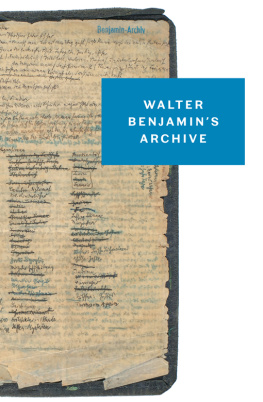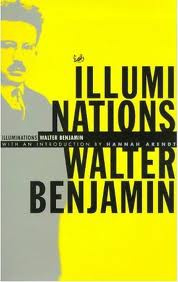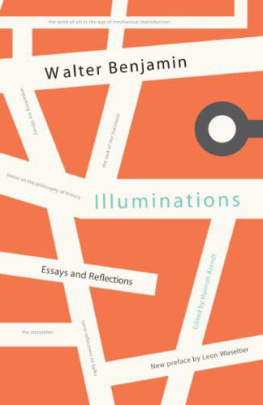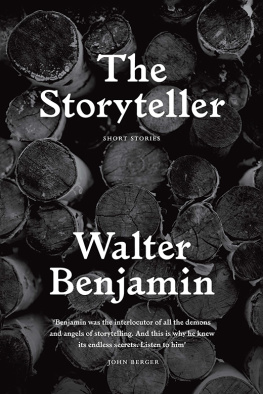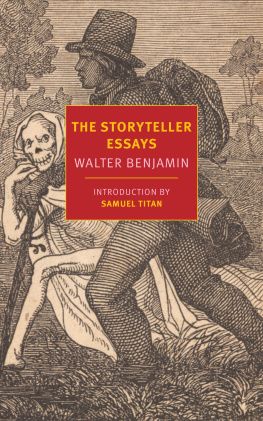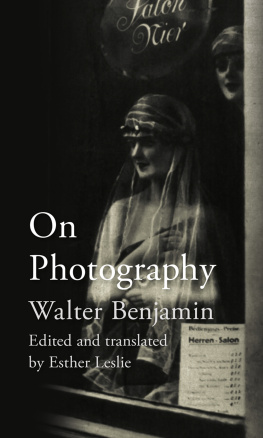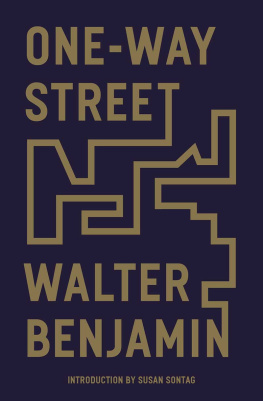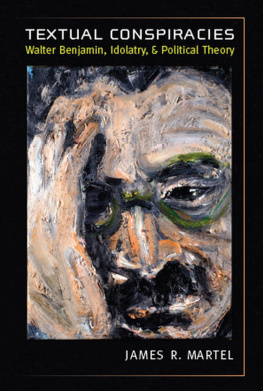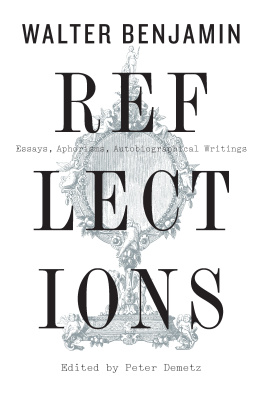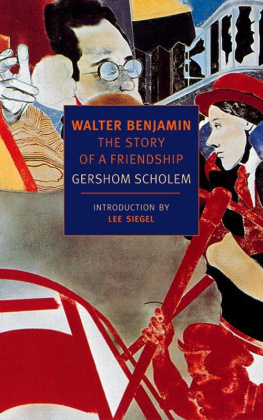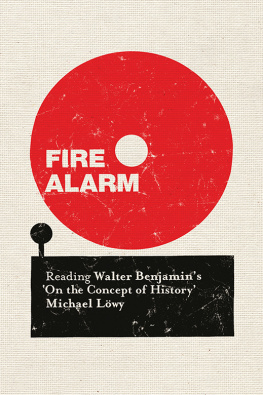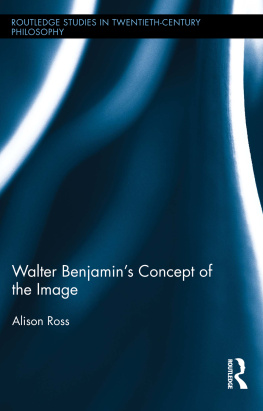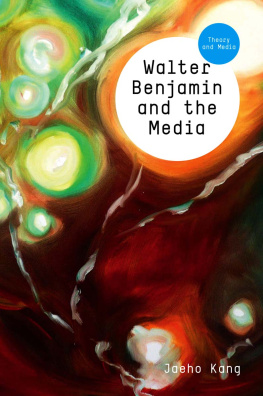Here we have a man whose job it is to gather the days refuse in the capital. Everything that the big city has thrown away, everything it has lost, everything it has scorned, everything it has crushed underfoot he catalogues and collects. He collates the annals of intemperance, the capharnaum of waste. He sorts things out and selects judiciously: he collects like a miser guarding a treasure, refuse which will assume the shape of useful or gratifying objects between the jaws of the goddess of Industry. This description is one extended metaphor for the poetic method, as Baudelaire practised it. Ragpicker and poet: both are concerned with refuse.
Walter Benjamins Archive
IMAGES, TEXTS, SIGNS
Translated by Esther Leslie
Edited by
Ursula Marx
Gudrun Schwarz
Michael Schwarz
Erdmut Wizisla

The Walter Benjamin Archive
is an Institute of the Hamburg Foundation
for the promotion of knowledge and culture
based in the Academy of Arts Berlin.
First published in paperback by Verso 2015
First published in English by Verso 2007
Translation Esther Leslie 2007, 2015
First published as Walter Benjamins Archive: Bilder, Texte und Zeichen by Suhrkamp Verlag Frankfurt am Main, 2006 Suhrkamp Verlag 2006; Expose of Paris, The Capital of the Nineteenth Century, Draft of the Arcades of Paris, Fragments of the General Layout, Layout for the Expose of Paris, The Capital of the Nineteenth Century, and Notes and Materials for the Arcades Project, all reprinted by permission of the publisher from The Arcades Project by Walter Benjamin, trans. Howard Eiland and Kevin McLaughlin, pp. 3, 34950, 87376, 91516, Cambridge, MA: The Belknap Press of Harvard University Press 1999 by the President and Fellows of Harvard College. Originally published as Das Passagen-Werk, ed. Rolf Tiedeman 1982 by Suhrkamp Verlag; Language and Logic and Language and Logic II, trans. Rodney Livingstone, reprinted by permission of the publisher from Walter Benjamin: Selected Writings, Vol. 1, 19131926, eds. Marcus Bullock and Michael W. Jennings, pp. 27273, Cambridge, MA: The Belknap Press of Harvard University Press 1996 by the President and Fellows of Harvard College; Dream Kitsch: Gloss on Surrealism, trans. Howard Eiland, Spain, 1932, trans. Rodney Livingstone, and Little History of Photography, trans. Edmund Jephcott and Kingsley Shorter, reprinted by permission of the publisher from Walter Benjamin: Selected Writings, Vol. 2, 19271934, trans. Rodney Livingstone and others, eds. Michael W. Jennings, Howard Eiland, and Gary Smith, pp. 35, 63839, 51415, Cambridge, MA: The Belknap Press of Harvard University Press 1999 by the President and Fellows of Harvard College; A Berlin Chronicle, Reflections: Essays, Aphorisms, Autobiographical Writings by Walter Benjamin, English translation 1978 by Harcourt, Inc., reprinted by permission of the Publisher.
All rights reserved
The moral rights of the author, editors and translators have been asserted
Photos
Gisle Freund Estate Gisle Freund, Paris
Germaine Krull Museum Folkwang, Essen
Sasha Stone Serge Stone, Blaricum
Photos supplied courtesy of Friedrich Forssman
1 3 5 7 9 10 8 6 4 2
Verso
UK: 6 Meard Street, London W1F 0EG
US: 20 Jay Street, Brooklyn, NY 11201
www.versobooks.com
Verso is the imprint of New Left Books
ISBN-13: 978-1-78478-203-0
eISBN-13: 978-1-78478-204-7 (UK)
eISBN-13: 978-1-78478-205-4 (US)
British Library Cataloguing in Publication Data
A catalogue record for this book is available from the British Library
Library of Congress Cataloging-in-Publication Data
A catalog record for this book is available from the Library of Congress
Typeset in Gill Sans Light by Hewer Text UK Ltd, Edinburgh
Printed and bound in the UK by CPI Colour
CONTENTS
Excavation and Memory
Language has unmistakably made plain that memory is not an instrument for exploring the past, but rather a medium. It is the medium of that which is experienced, just as the earth is the medium in which ancient cities lie buried. He who seeks to approach his own buried past must conduct himself like a man digging. Above all, he must not be afraid to return again and again to the same matter; to scatter it as one scatters earth, to turn it over as one turns over soil. For the matter itself is no more than the strata which yield their long-sought secrets only to the most meticulous investigation. That is to say, they yield those images that, severed from all earlier associations, reside as treasures in the sober rooms of our later insightslike torsos in a collectors gallery. It is undoubtedly useful to plan excavations methodically. Yet no less indispensable is the cautious probing of the spade in the dark loam. And the man who merely makes an inventory of his findings, while failing to establish the exact location of where in todays ground the ancient treasures have been stored up, cheats himself of his richest prize. In this sense, for authentic memories, it is far less important that the investigator report on them than that he mark, quite precisely, the site where he gained possession of them. Epic and rhapsodic in the strictest sense, genuine memory must therefore yield an image of the person who remembers, in the same way a good archaeological report not only informs us about the strata from which its findings originate, but also gives an account of the strata which first had to be broken through. SW 2:2, p. 576
Abbreviated sources to be found in bibliography.
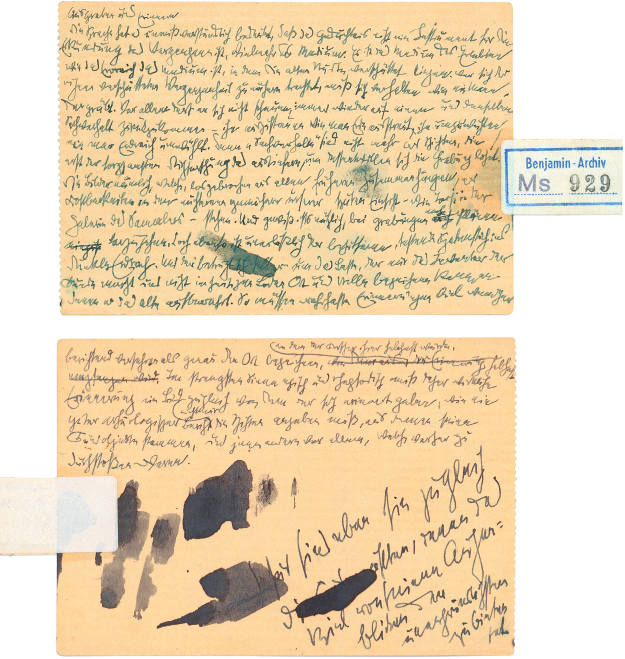
But when shall we actually write books like catalogues?
One-Way Street (SW1, p. 457)
His last archive remains a secret: the briefcase that Walter Benjamin carried over the Pyrenees in September 1940 is lost. Only one document that was transported in it survivesan authenticated letter from May 8, 1940, in which Max Horkheimer confirms Benjamins membership of the Institute for Social Research in New York and confirms that his researches have proven to be extremely helpful for the Institute. Lisa Fittko, who helped him and other refugees in their escape, attested that Benjamin wanted the briefcase to be saved above everything else; for supposedly his latest manuscript was inside, and it was the most important thing of all, more important even than his own life. It may possibly have contained the theses On The Concept of History. Any more detailed information is lacking. What is certain, however, is that the briefcase held some sort of texts by Benjamin. Papers with unknown contents are mentioned in a police report listing the belongings on his person at the time of his deathhis last possessions consisted of a watch, a pipe, six photographs, glasses, letters, magazines, and money, which was used to pay off the hotel bill and the costs of the funeral.
If Benjamin had not taken precautions his legacy would have suffered the same fate as the briefcase. It is impossible to imagine the effect that might have had on the reception of his work. The fact that his archive is so bristling with contents todaya fact that is barely comprehensible when viewed against the backdrop of his personal fateis due to the strategic calculation with which he deposited his manuscripts, notebooks, and printed papers in the custody of friends and acquaintances in various countries. His archives landed in the hands of others, so that their documents might be delivered to posterity. Those who received his work accepted the obligatory nature of their role and faithfully conserved the papers. With the ethos of an archivist Benjamin secured the continued life of his thought, a thought that sought to grasp the present through reading testimonials from the past.

